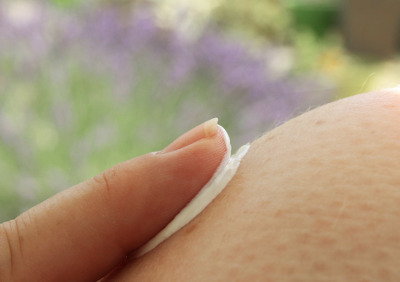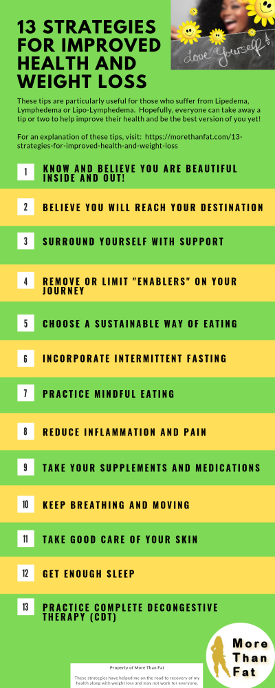13 Strategies for Improved Health and Weight Loss [Lipedema]
There are no miracle diets, pills or strategies for making unwanted weight disappear, nor to cure your chronic illnesses, such as Lipedema or Lipo-Lymphedema. Having said that, there are ways to dramatically improve your health in the areas of pain management, weight loss, and positive self-care. In my article I will outline 13 Strategies for Improved Health and Weight Loss [Lipedema] that have helped me on health journey.
I am not going to lie and say that change will be easy, but you need to ask yourself “what would I be willing to change if I could move better, breathe better, significantly reduce my pain levels, shed unwanted pounds of fat, reduce or eliminate my chronic disease(s), have lots more energy and live longer?”
After having done my share of research, networking with other ladies in my situation and made those changes myself, I can tell you these changes do in fact work! I have outlined below the motivations and changes I have made in my life to achieve positive outcomes. I am hoping there are many things here that can help you too. Let’s take a look at 13 Strategies for Improved Health and Weight Loss [Lipedema].
#1 – Know and Believe You Are Beautiful Inside and Out
No matter where your health and life journey takes you, know that you are unique and special in every way. There isn’t another you on the planet, which makes you truly special! Your heart and soul are what define you, not your fat or disease(s), so always let that shine brightly for everyone to see.
#2 – Believe You Will Reach Your Destination
It’s the journey that shapes us. What did we learn and experience that enriched our lives? If we fall, get back up and reset your sights on your goal. Do that as many times as it takes to arrive at your destination. I promise you all good things are worth the struggles and triumphs we experience on our journey!
#3 – Surround Yourself With Support
Some journeys are not meant to walk alone. Find family, a friend or even a stranger who shares your vision and will support you along your path. Join or start a support group for those working on the same goals as you. Avoid naysayers and those who seek to sabotage your journey to better health.
#4 – Remove or Limit “Enablers” on Your Journey
This person/people will attempt to sabotage your health efforts by providing things that keep you anchored in place. They may have good intentions, but they clearly don’t understand or support your desire to create a healthier version of yourself. Some may intentionally try to derail your efforts through bad food choices, lack of support in medically needed attention or corrupt your mind with damaging thoughts. You will need to change your path and walk a different road that is filled with positive thoughts and people, even if you have to go it alone for a bit.
#5 – Choose a Sustainable Way of Eating
Traditional or fad diets don’t work! Why? Because at some point you have to come back to eating real food that has to be prepared by you. The key to healthy eating is choosing a way of eating that is sustainable from the start. I personally like low carbohydrate or ketogenic eating plans while others may find success with Paleo or Mediterranean eating plans. Whichever you choose, make sure you eat real whole organic non-gmo foods and a colorful array of vegetables.
Many don’t like this idea as it appears to promote “disordered eating” habits. Of course, you can choose to put whatever you want into your body, but then don’t expect to regain health when you show a disregard or lack of understanding on what your body actually needs to function optimally. Remember, eating to make you happy is not the same thing as eating to making you healthy! The past 40 years of food consumption in the United States has demonstrated this point.
#6 – Try Intermittent Fasting
Dr. Jason Fung, a leading Nephrologist and an established expert on Keto and Fasting, tells us that health and weight management all comes down to one thing – the management of the hormone insulin in our system. Equally important to WHAT we eat is WHEN we eat! When we eat, insulin production is triggered, thus thwarting any fat burning efforts. If we eat three meals a day and snack until we go to bed, then insulin is constantly spiked. This will lead to weight gain instead of weight loss! It also does not give our stomach a chance to rest or our body to perform a myriad of “clean-up” processes necessary to promote optimal health.
Intermittent fasting (not the same as intentional starvation) can produce positive effects from increased cellular health, prevention of disease, clean-up processes like autophagy and apoptosis (removal of dead cell content and no longer needed cells) and a chance for a leaky gut to heal.
#7 – Practice Mindful Eating – Examine What, When and Why You are Eating
When you bring your utensil or fingers to your mouth with food or drink, ask yourself “what benefit will this food serve my body?” Your answer will determine your relationship with food.
If your answer is it will fuel my body with healthy sources of vitamins, minerals and nutrients then you have probably done your research into what your body actually needs to be healthy. If your answer is it tastes good and makes me happy but probably isn’t the healthiest choice, then you are probably like millions of other people who eat to calm emotions, relieve stress or have developed an insatiable sweet tooth.
Where and when do you eat? Is it in front of the television, in the car on the go, at social events and gathering, at restaurants or at the dining room table with the family? Distracted eating can cause us to overeat or consume low to no-quality foods if we don’t plan carefully. Stock only healthful foods in your pantry. Plan your meals ahead of time to avoid impulse eating. Make eating your meals purposeful and focused to avoid binge eating and enjoy the tastes of your food.
A treat once in a while is not a bad thing. However, you need to address emotional eating and develop a healthy relationship with food. If we want our bodies to work better, feel better, resist chronic disease and live longer, then we need to give our bodies the right fuel.
#8 – Reduce Inflammation and Pain
Seek to reduce inflammation and pain levels naturally through food rather than medications. Sugars. in any of its 50+ forms, spike insulin levels, acting as a fuel for our inflammation and pain. Try to limit or eliminate sugars in your food, including sugar substitutes which can have negative effects on your insulin levels too. If you suffer with chronic inflammation, eating sugar is akin to throwing gas on fire!
This concept also applies to pre-processed boxed or frozen foods and those foods marked as low fat. Reducing your inflammation and pain levels is key for reducing dependence on long term pain medications and keeping us mobile. Wouldn’t you also like to feel happier with significantly reduced pain?!
#9 – Take Your Supplements and Medications
If testing has shown you are deficient in one or more vitamins, minerals or nutrients your doctor may have prescribed supplements to meet your body’s nutritional needs. These supplements may be medically necessary to help your body provide essential regulatory or absorption functions that re-balance your health.
Make sure you take any prescription medication that corrects a bodily function impairment, such as insulin for a Type 2 diabetic condition. If you change your eating habits to a healthier plan or shed unwanted weight, you will want to check in with your doctor to see if dosages need to be adjusted or perhaps eliminated altogether.
Do not stop taking or adjusting dosage sizes without consulting with your doctor first! You need to avoid causing injury or harm to yourself by getting too much or too little of required medications or supplements.
#10 – Keep Breathing and Moving
One of the worst things we can do is stop moving or exercising. Now matter how large or misshapen you may be, you need to be as active as possible. If you can go to the gym – great. If you are limited to just walking around the street or the park – that’s great too. However, if you are very large (like me) with very little mobility, then work on building your core muscles and use resistance bands to build arm and leg strength. It may take a while to see your desired results, but it is essential not only to keep or rebuild muscles but to keep your lymphatics active!
The pool can be a great resource for those with lipedema, lymphedema or lipo-lymphedema as water resistance helps build muscle tone while minimizing stress on your joints. Even deep breathing exercises can help with circulation and increasing lung capacity. Find a movement plan that works safely for you.
#11 – Take Good Care of Your Skin

Skin is the body’s largest organ. It is also the one we need to watch closely as it is vulnerable to infections, tears, bruising, cuts, punctures, burns and rashes. Those with lipedema, lymphedema and especially lipo-lymphedema need to regularly care for their skin by practicing good hygiene habits and moisturizing with healing lotions and anti-fungal creams.
We also need to vigilant about any signs of cuts, punctures and signs of cellulitis. They could invite toxic bacteria into our system, which can cause severe sickness and pain and lead to possible hospitalization. See your doctor immediately if you suspect cellulitis! Getting anti-biotics into your system in a timely manner is paramount to limiting the spread of infection and reducing its severity.
#12 – Get Enough Sleep
Getting the required 7.5 to 8 hours of sleep each night is essential to overall body function and weight management. Did you know getting too little sleep leads to weight gain? When the body’s insulin levels can’t process incoming food into usable energy it stores it as fat, probably the opposite of what you were trying to accomplish.
Lack of adequate sleep creates a “foggy” brain meaning the other hormone levels in your body, such as cortisol (flight or fight hormone), leptin (satiety hormone) and ghrelin (hunger hormone) lose their ability to regulate your system into eating properly. It can cause overeating, cravings, late night feasting and other stored fat producing activities. Sleep nourishes the brain, giving it the clarity needed to make good (food) decisions and help regulate metabolic function.
#13 – Practice Complete Decongestive Therapy (CDT) [for Lippy Folks]
Complete Decongestive Therapy (CDT) is a four-part commonly prescribed and practiced routine of care for treating those with Lipedema and especially those with Lipo-Lymphedema (primary Lipedema with secondary Lymphedema). It is essential you and your physical therapist sit down to map out a strategy that cares for your whole body tailored specifically for your needs. Be sure you address the following:
- Skin care
- Manual Lymph Drainage
- Compression Bandaging
- Exercising
Once your therapist has completed a tailored CDT plan for your specific needs, they will place you in maintenance mode. This means you will be performing the same care on a regular basis by yourself or with the assistance of family and friends. It is vital you follow the prescribed protocol to help improve your health and quality of life!
13 Strategies for Improved Health and Weight Loss [Lipedema] Conclusion
I sincerely hope you have been able to take away one or more important changes in my list you could make in your life to help achieve your health goals. Remember, you are more than the sum of your parts. It will take changing more than one thing to get your health recovery on the right path.
Eating correctly is a big key to controlling health and longevity. What we eat and when we eat are essential to not only losing unwanted pounds, but also allowing the body to perform critical metabolic maintenance processes when it isn’t busy trying to digest food. Keep carb consumption low and eliminate as much sugar and processed foods as possible to reduce pain and inflammation. Choose a sustainable way of eating that is effective for you and remember to eat real whole organic non-gmo foods!
Move and breath deeply as often as you can and in whatever manner is safe and doesn’t cause pain. Build strength in your core and then move out to your limbs. Soon you will be walking, biking, swimming and possibly even running marathons. It all starts with a commitment to keep moving daily.
Perform daily self-care on affected body parts through CDT. Surround yourself with positive supporting people and love yourself through the journey! You are an unique person with a remarkable story to tell of struggle turned into triumph and victory. Let yourself shine and light the way for others to see. Become the best version of you yet through positive lifestyle changes!
I would love to hear what motivates you and if you found any of my tools helpful in your health journey. Drop me a note below and let me know about your journey.
To your improved health!



thanks for the list you provided here. This is an awesome blog. More power!
Thank you for your kind words! I am very glad you found it informative. These strategies have helped me jump-start my journey back to improved health and I am sure it can help others too as we struggle with lipedema and all the related co-morbidities. Please check back soon as more great information is on its way! – Esther